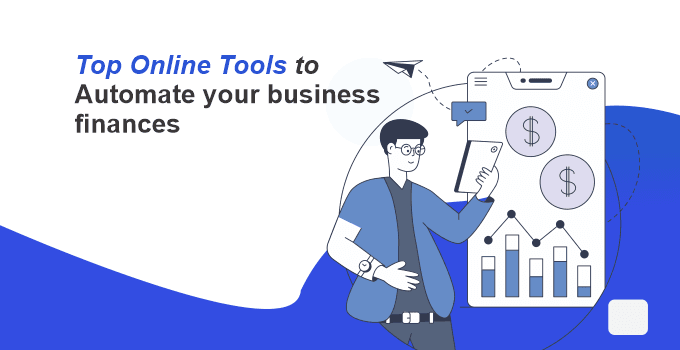Top 7 Online Financial Management Tools for 2024
An important component of running a business is keeping track of finances. This is something that should be an ongoing task, however, owing to the variety of online tools it can be quite daunting knowing where to start. Personal finance is a never-ending battle that most of us face. Business owners receive a lot of financial information from different sources including bank statements, PayPal reports, and PayPal Payments Advanced reports. Although it is easy to manage finances through one dashboard, the process of gathering financial data from different accounts does take a lot of time.
To combat this problem, you can use some online tools to automate your business finances. Today I am going to share with you five such tools to automate your business finances and will make managing your business financial data much easier.
7 Online Tools to Keep Business Finances Organized
Here are the seven best tools that you can utilize to organize your busniess finances:
- QuickBooks: Comprehensive Accounting Software
- Wave Financial: Budget-Friendly Financial Automation
- Adaptive Planning by Workday: Advanced Financial Forecasting
- GoDaddy Accounting: Simplified Financial Management for Small Businesses
- Oracle Netsuite: ERP for Large-Scale Financial Operations
- Freshbooks: Streamlined Accounting for Small and Medium Businesses
- Xero: Extensive Integration for Versatile Financial Tracking
Let’s know about each of these tools in detail.
1. QuickBooks
Quickbooks is accounting software that features a user-friendly interface and an easy way to handle accounting information for individuals as well as businesses.
The online edition of QuickBooks supports cloud-based accounting, which enables convenient access to accounting data from anywhere. QuickBooks has a wide range of capabilities, and users may think of it as all-in-one software. Larger plans, like any other program, come with greater features.
On QuickBooks, the majority of functions can be automated. QuickBooks is a trustworthy online tool since it saves time for businesses by monitoring sales and taxes, gathering data for reports, handling invoicing, and even tracking inventory.
QuickBooks can help freelancers and other independent workers automate their finances so that they don’t have to spend so much time and effort on mundane tasks. Pricing varies, but begins at £5.98 and rapidly rises when add-ons and larger plans are added. The greater the price, the more the number of users.
2. Wave
Wave may be the greatest choice for controlling and automating company finances for the thriftiest businesses. Free accounts are available with this accounting software, however extra add-ons may be purchased. 2.9 percent + £.26 for credit card transactions, and 1% for ACH transfers.
Real-time access to your company bank account is possible. The program’s ability to connect to an infinite number of accountants is another important feature. Wave Financial, while being a free platform, offers excellent automation and monitoring capabilities. Receipt capture and hundreds of financial reports are available to help you keep track of your expenditures.
Click here to read: What Are The Top 5 Benefits of a Cloud ERP?
3. Adaptive Planning
Forecasting sales, planning budgets, and preparing for the future are all part of financial management for companies. Workday has developed Adaptive Planning, a cloud-based CPM program to assist with financial planning for individuals acquainted with the Workday platform.
Budgeting, income forecasting, and reducing company expenditures are all made easier with this online application. Airbnb, Hubspot, and Goodwill have all utilized this technology to design their businesses. The ‘what-if’ scenarios that this software generates for users are what make it such a useful tool for companies. When it comes to company money, this may help you make smarter decisions. Businesses will need to contact Workday for the price since the software tool is quote-based.
4. GoDaddy
GoDaddy is useful for much more than just registering a domain and setting up a website. They provide accounting software that assists small companies and internet merchants in automating their financial operations.
Businesses can manage sales both online and offline with this cloud-based, real-time software. For more precise company expenses, mileage and time may also be monitored.
The accounting software is reasonably priced, with the most basic subscription beginning at only £4.27 per month. In all, there are three tiers of plans to select from. The Internal Revenue Service divides company expenses into several categories. GoDaddy accounting helps you automate transactions by categorizing them for you. The biggest plan, which costs £12.82, includes additional useful tools including tax worksheets and regular invoicing.
5. Oracle Netsuite
This accounting software may be beneficial to large businesses. Enterprise resource planning (ERP) capabilities in the program may help you grow your company. Taxes may be managed, as well as permissions for functionality and access. Despite being a big company, the software may still be able to assist businesses that are experiencing expansion.
Oracle Netsuite supports all currencies and exchange rates, which is a major plus for large businesses that are likely to sell goods and services worldwide. For simpler financial administration, the program includes a payment management system. Companies must contact Oracle for bespoke pricing to use this platform.
Click here to read: 7 Tips for Running a Successful Company
6. Freshbooks
For many companies, basic accounting is all that is required to handle their money at first. Freshbooks is an online accounting solution that is ideal for small to medium-sized companies. There are four distinct online tool versions to choose from.
This application is ideal for companies that need to automate their invoicing. Freshbooks can help you keep track of time and manage your tasks. Small and medium companies stand to benefit the most from this software since it works best with simpler budgets. As a result, bigger businesses with more complicated budgets may not be as well suited to Freshbooks.
7. Xero
When it comes to accounting software solutions, Xero’s interoperability choices are unrivaled. With over 700 connections available for Xero, a broad variety of customers may automate their company finances with ease. Plans with Xero start at only £7.69 per month for small businesses and go up from there with services like inventory management and monitoring.
On this online application, users will find it simple to collaborate. It’s important to remember that while there aren’t extra costs associated with adding members, adding just any members may not be in the company’s best interest. Because Xero generates over 50 financial reports, much financial paperwork may be automated. This accounting software may be a good match for expanding companies that cooperate on financial matters.
Click here to read: How to Make Big Data Implementation a Success
Final Thoughts
Online tools help automate your business finances, making it convenient for you to understand the financial health of your business. They provide you with a complete picture of your financial situation where you can keep track of what is going on in all the areas of your business. It’s simple to see your finances in one place. You can also see the expenses made by the employees if any.



